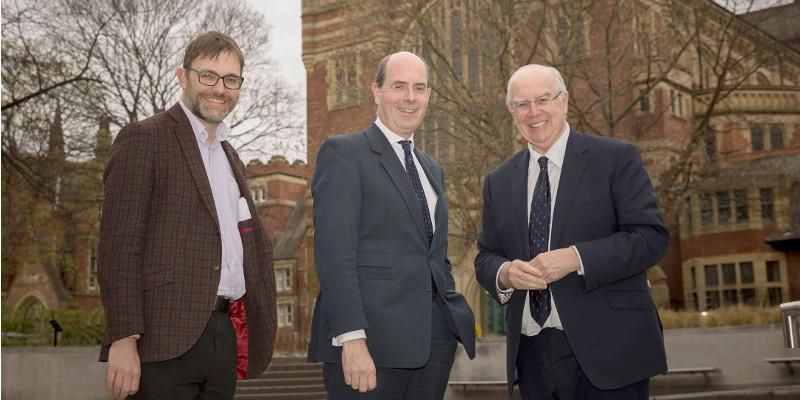
The new head of the UK’s Research and Innovation agency, which ultimately funds the majority of university research, is due to outline his priorities and views on funding in the coming years tomorrow.
Sir Mark Walport, Chief Executive of UKRI, will set out his position in his first official speech, ahead of the agency’s formal launch next year.
In April, his colleague Sir John Kingman, interim chair of UKRI, visited the University of Leeds and met senior professors and the Vice-Chancellor.
During that visit, Sir John was shown the impact of the University’s research and its commitment to supporting early career academics.
He also learnt about the areas of research strength at Leeds, alongside the University’s future plans and its significant investment in facilities and technology.
Sir John described the University of Leeds as ‘one of the UK’s greatest research universities’ and explained to senior professors the role which UKRI expects to have in supporting research, both in terms of projects and people.
He said the existing funding bodies would continue to operate under UKRI, and the extra £2 billion of funding per year by 2020 announced in the Autumn Statement would give them an opportunity to think more strategically about how they invested in research in universities.
Excellence in research
Among the research centres which Sir John learnt about during his visit to Leeds were:
Leeds Institute for Data Analytics, which has developed state-of-the-art physical and IT infrastructures to raise the bar in standards of data quality, access, protection and use.
Astbury Centre for Structural Molecular Biology, one of the best equipped centres for fundamental research in its field in Europe, which has just invested £17m in new cryo-electron microscopes and nuclear magnetic resonance equipment.
Priestley International Centre for Climate, which brings together expertise in climate change including its impact on society and ecosystems.
Water@Leeds, which encompasses expertise across the physical, biological, chemical, social and economic sciences and engineering as well as the arts.
University impact
Sir John also heard from Professor Lisa Roberts, Deputy Vice Chancellor: Research and Innovation, about the University’s impact across higher education, and in sciences, the arts and humanities.
Professor Roberts highlighted the university’s key successes to date:
- Ranked 10th for research power and ninth for research impact in the UK, with 83 per cent of research rated ‘world leading’ or ‘internationally excellent’ in the most recent Research Excellence Framework.
- Awarded two Queen’s Anniversary prizes, for Transport Studies and Mechanical Engineering.
- Created over 100 spin-out companies since 1995.
- Seven spin-out companies listed on AIM, more than any other university.
She discussed further centres of excellence, including medical and biological engineering, which has received more than £100m in funding in medical technology since 2009; and electronic and electrical engineering, which was ranked in the top five departments in the last Research Excellence Framework.
Future developments
Sir John was told about the forthcoming Integrated Campus for Engineering and Physical Sciences, which will host the University’s Bragg Centre. Forming a £96m project, it is the biggest single investment ever made on campus and is part of the University’s £520m campus plan to help secure its position as one of the UK’s top 10 research universities.
Also highlighted was Nexus, the new £40m innovation centre which will provide a step change in how the university opens itself to industry and business, as was the planned Institute for High Speed Rail Engineering, due to be launched later this year.
Professor Roberts stressed the importance of matching investment in research infrastructure with investment in people across the whole career spectrum. She discussed plans to raise the number of PhD students by 500 to 2,800 by 2019, and to recruit 250 University Academic Fellows and 40 top-performing professors by 2020. This sets the context for a successful university with long term plans in place, and well defined centres of collaborative research excellence.
UKRI insight
Speaking to leading professors and several University Academic Fellows, Sir John gave an insight into UKRI’s likely priorities, once it is formally launched in April next year.
He said a continued focus on supporting scientific excellence would be coupled with a focus on commercialising the most significant discoveries.
In the context of the additional £2bn research funding announced by the Chancellor Philip Hammond in the Autumn Statement he said arts and social sciences would also be backed, but he encouraged researchers in those fields to bring exciting and interesting ideas to the table.
Acting as an advocate, and a voice for the research community would also be important, he said, as the Government negotiates the Brexit settlement.
Read the Vice-Chancellor’s most recent comments on UKRI
Further information
The above photograph shows Sir John Kingman (centre) with Professor Andy Dougill, Dean of the Faculty of Environment (left) and Sir Alan Langlands, Vice-Chancellor of the University (right).
Journalists requiring more information about the University and its research strengths should email the University of Leeds press office at pressoffice@leeds.ac.uk.